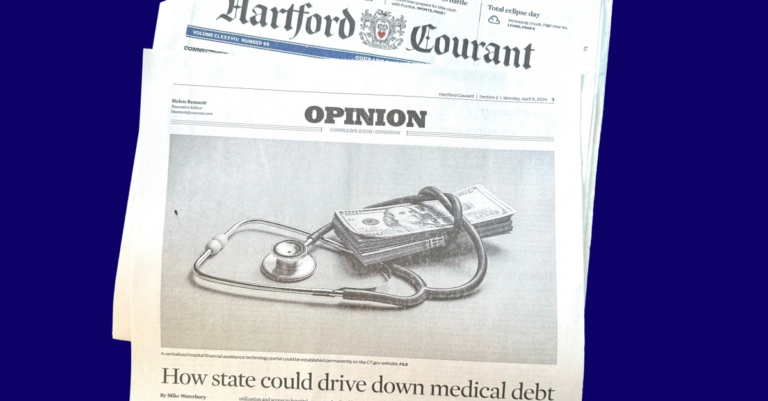We need to eliminate medical debt in this country. Outlawing surprise billing is a start, but we also need to address predatory pricing, aggressive legal actions and other root causes of medical debt. We need to understand, with data, what is causing medical debt and agree to start fixing those issues with all stakeholders.
The COVID-19 Pandemic taught all of us many things. One of the sectors that the pandemic put a spotlight on was the healthcare industry. The pandemic showed the resilience of the US healthcare system, but it also pointed out some important areas in need of improvement.
In our interview series called “In Light Of The Pandemic, Here Are The 5 Things We Need To Do To Improve The US Healthcare System”, we are interviewing doctors, hospital administrators, nursing home administrators, and healthcare leaders who can share lessons they learned from the pandemic about how we need to improve the US Healthcare System.
As a part of this series, I had the pleasure to interview Michael Waterbury.
Michael Waterbury is founder and CEO of Goodroot, a community of companies reinventing healthcare one system at a time. After a 20-year career as a health plan executive, he became an entrepreneur on a mission to increase access and affordability to quality healthcare through innovation. To date, Goodroot has launched five companies, each addressing a different problem in the healthcare industry and collectively eliminating $800 million in wasted healthcare spending since 2015.
Thank you so much for joining us in this interview series! Before we dive into our interview, our readers would like to get to know you a bit. Can you tell us a bit about your backstory and a bit about what brought you to this specific career path?
I started my career at an exciting up-and-coming managed care company and spent the better part of 25 years working very hard to learn as much as I could about the complex healthcare system. While the quality of care in our system is unmatched, I came to learn how truly broken our industry is and that there are many different, intertwined factors making the cost of care unreasonably high. I’ve used that knowledge to start five successful healthcare companies with talented people, each dedicated to lowering cost, creating equal access, and improving the quality of care in the US.
Can you share the most interesting story that happened to you since you began your career?
At age 25, I worked on a complicated project to adjust how we were paying oncologists in New York for chemotherapy. We had no idea how much the drugs cost, but we knew that we were overpaying for them and they were getting expensive. Our program reduced the cost of these drugs to acquisition cost plus 20 percent. A 20 percent markup seemed reasonable to me, but the oncologists did not think so.
I had to spend a few days meeting with physicians about this at the LaGuardia Marriott and it was not pretty. They were angry. One after another would tell me about the challenges of cancer, the specifics of their patients and question me, “Who are you to determine how much I should get paid?” I was this young guy, struggling, meeting physicians who are caring for people with cancer and they are all angry at me. I was ready to give up and then something hit me. Wait a second! We are overpaying. All this anger is about profit. It’s not right and not sustainable and I should not back down.
When a brash, young oncologist from the Upper West Side showed up and started in on his speech, I decided to push back. I said, “You have used the word ‘cancer’ five times in the first three minutes of our discussion. Based on that, I know this is all about the money to you, so let’s cut to the chase. How much do you want?” He said he wanted 30 percent above cost. I countered with 25 percent and he agreed.
This was an eye-opening exposure to the darker side of care. I had a choice to make: Should I leave the industry because it’s too corrupt? Or should I dig in and try to be part of a solution? I did not realize it at the time, but that moment led me to form Goodroot. Twenty years later, we’re reinventing healthcare one system at a time and I’m enacting a promise I made to myself all those years ago to change this industry for the better.
Can you share a story about the funniest mistake you made when you were first starting? Can you tell us what lesson you learned from that?
Early in my career, I had the opportunity to participate on a medical policy committee. At times, it was not the most interesting few hours of my month, but it did give me a very in-depth view of how decisions were made about what was covered and ultimately paid for by a health plan. I remember one policy that was discussed and debated that one could find somewhat interesting and maybe even funny. It was the Viagra policy. The key decision was how many pills would be covered per month. I distinctly remember our Chief Medical Officer at the time making the decision to cover 6 pills a month. When asked what clinical evidence he used to come to this conclusion, he said, “nobody is going to get more pills than I would need in a month.” A few years later while on a train to Albany to meet with New York healthcare regulators, I reminded this person of his response to this question and he said to me, “I am glad you reminded me, we need to reduce that policy to 4 pills.”
I learned from this story that healthcare is very personal, and the administration of healthcare does have a direct impact to people’s lives almost as much as the actual care people receive. This experience along with many others have shaped my commitment and passion to reinvent healthcare one system at a time to make healthcare more affordable for all Americans including my friends and family. It helped me to connect to the actual impact I could have each day in my professional career.
Can you please give us your favorite “Life Lesson Quote”? Can you share how that was relevant to you in your life?
One of my favorites, which I have learned recently, is “Use language to define your future.” The future is unknown. There are no benchmarks or data to define your future. If you clearly state what you want it to be, the likelihood of that future becoming a reality dramatically increases. Then if you write down the steps you need to take to get there, nothing can stop you.
Are you working on any exciting new projects now? How do you think that will help people?
Yes. At Goodroot we are creating a company that will resolve medical debt for Americans and then address the root causes of what created that debt. This will help millions of people who are suffering from medical debt and create a transparent way to identify and fix the underlying root causes.
How would you define an “excellent healthcare provider”?
An excellent healthcare provider is one that puts the patient first, no matter the challenges presented by the current system. We all can recognize that becoming a provider requires years of dedicated training, compassion, great communication and a relentless desire to help people. However, this also means only performing necessary services for patients and not being driven by money.
Ok, thank you for that. Let’s now jump to the main focus of our interview. The COVID-19 pandemic has put intense pressure on the American healthcare system. Some healthcare systems were at a complete loss as to how to handle this crisis. Can you share with our readers a few examples of where we’ve seen the U.S. healthcare system struggle? How do you think we can correct these specific issues moving forward?
The pandemic highlighted the fact that healthcare is a prepaid service, and there’s an inherent unfairness that comes with that. The care that we expected to access in early 2020, prior to Covid mandates, was already paid for in advance. Insurance companies collected billions of dollars in premiums for care that was never delivered. We recognize that some of the care was delayed, but those premium dollars were not refunded to employers or used to lower healthcare premiums in subsequent periods. This unintended consequence of the pandemic proved the current risk model is not working for businesses across the US. They get squeezed no matter what.
Of course the story was not entirely negative. Healthcare professionals were true heroes on the front lines of the crisis. The COVID vaccines are saving millions of lives. Can you share a few ways that our healthcare system really did well? If you can, please share a story or example.
I think the big, integrated players in the system demonstrated an ability to leverage their size to mobilize and adapt to the needs of Americans. The large pharmacy chains adapted to get life-saving medications delivered to patients and create vaccination distribution capacity.
Here is the primary question of our discussion. As a healthcare leader can you share 5 changes that need to be made to improve the overall US healthcare system? Please share a story or example for each.
- We need to eliminate medical debt in this country. Outlawing surprise billing is a start, but we also need to address predatory pricing, aggressive legal actions and other root causes of medical debt. We need to understand, with data, what is causing medical debt and agree to start fixing those issues with all stakeholders.
- In order to reduce soaring drug costs, Congress should repeal the 1987 safe harbor law that exempts PBMs and GPOs from antikickback laws. This reform will end opaque drivers of price distortion.
- Patients should be able to access the lowest drug prices automatically at the pharmacy regardless of the insurance price for that drug. (Surprisingly, the cash price for medications — the price charged to people without insurance — is often lower than co-pays.) This will eliminate the challenge of high prices on generics and create a competitive marketplace.
- We need to start fixing health care by switching to a more honest lexicon. Everybody needs to understand healthcare at a deeper level to drive change. Even lawmakers don’t understand our system, which prevents them from effectively legislating improvements.
- Fundamentally we need to reclaim integrity between payors and providers. We must make it simpler to pay for care. It has become a game of misrepresenting the services provided to get more money and spending way too many resources trying to police those games.
Let’s zoom in on this a bit deeper. How do you think we can address the problem of physician shortages? What about physician diversity and physician burnout?
These are not topics I focus on day to day, but if we make the administration of healthcare more efficient and allow physicians to spend time caring for patients, I think this will reduce burnout and drive more physicians into practice.
Under our current system, those with the fewest resources often pay the most for care. Medical debt is the leading cause of bankruptcy in the US. Imagine how many more families of diverse backgrounds could afford to send their kids to medical school were they not crushed by a system that looks out for the financial interest of everyone but the patient.
What concrete steps would have to be done to actually manifest all of the changes you mentioned? What can a) individuals, b) corporations, c) communities and d) leaders do to help?
You are a person of great influence. If you could inspire a movement that would bring the most amount of good to the most amount of people, what would that be? You never know what your idea can trigger.
Everyone needs to work to understand healthcare at a deeper level and become an educated buyer of care. We need to focus on our health by making healthier decisions. Specifically, today, I would like to see hospitals stop aggressively pursuing patients for medical debt and offer fair discounts to individuals when they must pay for care. The major insurers must commit to resolving the issues causing medical debt and agree to fund payment of debt until these issues are resolved.
How can our readers further follow your work online?
Learn more about each of the Goodroot companies and follow them on social media at the links below.
- Goodroot — A home for healthcare professionals with a drive to make the system better.
- RemedyOne — A formulary optimization company that uses technology and expertise to provide clarity and reveal opportunities for savings.
- AlignRx — A consulting practice that advises benefit consultants, employers and health plans on benefits, rebates, plan design and other pharmacy-related matters.
- Penstock — A healthcare payment integrity and reimbursement company that lowers healthcare costs through permanently correcting recurring medical billing errors.
- CoeoRx — Enables small employer groups to access pricing and clinical programs normally unavailable to them.
Thank you so much for these insights! This was very inspirational and we wish you continued success in your great work.








